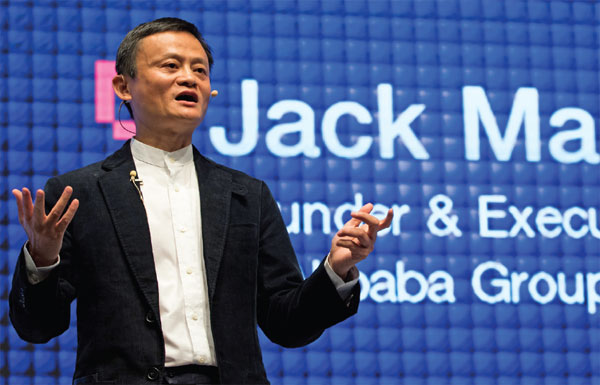Ma to offer insights on winning in business
By Edith Mutethya (China Daily Africa) Updated: 2017-07-16 14:26China's star entrepreneur will give advice and ideas to local enterprises during his first visit to Africa
Jack Ma, the founder and executive chairman of Alibaba Group and special adviser for young entrepreneurs and small businesses to the United Nations Conference on Trade and Development, will visit Africa for the first time on July 20, going to Kenya and Rwanda.
Ma, hosted by UNCTAD and the Kenyan government, will meet young entrepreneurs and small enterprises, share ideas and his experiences, and explore opportunities to participate in global trade. The visit will also raise awareness about the UN's 2030 Agenda for Sustainable Development.
|
Jack Ma, founder of Alibaba Group, will visit Africa for the first time on July 20 and meet with young entrepreneurs and small enterprises. Provided to China Daily |
Ma's entrepreneurial insights will come in handy, since entrepreneurship has offered an opportunity to many of the world's poor to earn a sustainable livelihood. Entrepreneurship also significantly contributes to sustainable development by creating jobs and driving economic growth and innovation, fostering local economic development, improving social conditions and tackling environmental challenges.
Calling the opportunity to serve as the UNCTAD special adviser an honor, Ma says he aspires to make it easier for young entrepreneurs and small businesses, particularly in developing countries, to become part of global trade.
"I have spent my career working with entrepreneurs, and I know the positive social and economic impact that comes with people being given the opportunity to participate in the global economy," he says.
The three-day visit will coincide with the YouthConnekt Africa Summit, to be held in Kigali, Rwanda, from July 20 to 21, with the theme "Realizing Africa's youth potential". The event will bring together government officials, entrepreneurs, investors, multinationals and startups, with the aim of shaping the African technological ecosystem to drive the continent's economic growth.
The summit is expected to attract more than 1,500 participants, including top executives from multinational companies that operate in Africa, civil organization leaders, Africa's development partners and members of the academia, as well as successful entrepreneurs, artists and youth opinion leaders from across the continent.
Ma will be among the key speakers at the summit, which is co-organized by the government of Rwanda, UNCTAD and the United Nations Development Programme. Its purpose is to empower young people across Africa with skills development and entrepreneurship.
Launched in 2012 by the government of Rwanda, the Youth ConnektAfrica initiative is a multi-faceted program that engages young people in national dialogue and helps them to create their own employment and entrepreneurship opportunities.
Ma emphasizes the benefits of globalization and the many e-commerce opportunities that are yet to be seized. He says the role of trade in the global economy is at a crucial juncture.
"I am a strong believer in the benefits of globalization, and we cannot lose sight of the immense gains that trade has brought to people around the world," Ma says.
He believes that the benefits of globalization can be expanded to small businesses and young entrepreneurs and that it can be more inclusive for universal development. He defines globalization as creation of jobs and value for local people, as well as making technology and finance inclusive.
"I believe that if trade starts, war stops. Trade is not just about product exchange, it is about the exchange of ideas, innovation, and culture. This is what we want to achieve over the next 30 years, for entrepreneurs to be the drivers of job creation," he says.
"That is our 30-30-30 philosophy - that over the next 30 years, people below 30 years old will establish businesses with fewer than 30 employees."
With the new generation of technology and infrastructure, Ma says the rapid adoption of internet and e-commerce globally has offered a historic opportunity to promote inclusive development.
"The emergence of e-commerce platforms has paved the way for inclusive trade and economic development, allowing more countries, enterprises and entrepreneurs to participate in global trade," he says.
In China, e-commerce has become a pillar of the country's economy instead of a supplement, and it has created new business norms to transform the country's economic landscape, Ma says.
"It is the main course, rather than the dessert as it is in other parts of the world," he adds.
edithmutethya@chinadaily.com.cn
- 'Cooperation is complementary'
- Worldwide manhunt nets 50th fugitive
- China-Japan meet seeks cooperation
- Agency ensuring natural gas supply
- Global manhunt sees China catch its 50th fugitive
- Call for 'Red Boat Spirit' a noble goal, official says
- China 'open to world' of foreign talent
- Free trade studies agreed on as Li meets with Canadian PM Trudeau
- Emojis on austerity rules from top anti-graft authority go viral
- Xi: All aboard internet express












